|
|
|
Sort Order |
|
|
|
Items / Page
|
|
|
|
|
|
|
| Srl | Item |
| 1 |
ID:
124708
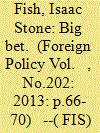

|
|
|
|
|
| Publication |
2013.
|
| Summary/Abstract |
THE TAIWANESE ISLANDS of Matsu do not seem like an ideal spot for one of the world's biggest casinos. Although they are ringed by rocky beaches and azure water, only about 10,000 people live on the 19 tightly clustered flyspecks, some 126 miles away from the main island Taiwan. An Associated Press reporter who visited in 2012 described Matsu's few shops as "a complex of decaying concrete structures that are most notable for their low-wattage gracelessness." Besides a small tourism industry, the islands' chief draw is sorghum-based liquor that, to the uninitiated, smells like embalming fluid.
|
|
|
|
|
|
|
|
|
|
|
|
|
|
|
|
| 2 |
ID:
132772
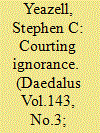

|
|
|
|
|
| Publication |
2014.
|
| Summary/Abstract |
Most of the United States' judicial work takes place in the country's state trial courts. These tribunals preside over everything from traffic tickets to murder trials, from routine debt collection to massive environmental torts. Given their expansive role, the manner in which these courts function is of immense significance. But ultimately, we know very little about these institutions. Our ignorance flows both from trivial bureaucratic turf battles and from deeply rooted principles of local government, a phenomenon I have called "data federalism." In the last few decades, we have begun to form a partial image of the activities of these organs of government; but we know almost nothing about their past, and the little we do know suggests the dangers of extrapolation. This essay explores the extent of our ignorance of state trial courts and the difficulties of overcoming it.
|
|
|
|
|
|
|
|
|
|
|
|
|
|
|
|
| 3 |
ID:
132773
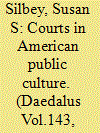

|
|
|
|
|
| Publication |
2014.
|
| Summary/Abstract |
In American public imagination, courts are powerful but also impotent. They are guardians of citizens' rights but also agents of corporate wealth; simultaneously the least dangerous branch and the ultimate arbiters of fairness and justice. After recounting the social science literature on the mixed reception of courts in American public culture, this essay explains how the contradictory embrace of courts and law by Americans is not a weakness or flaw, nor a mark of confusion or naïveté. Rather, Americans' paradoxical interpretations of courts and judges sustain rather than undermine our legal institutions. These opposing accounts are a source of institutional durability and power because they combine the historical and widespread aspirations for the rule of law with a pragmatic recognition of the limits of institutional practice; these sundry accounts balance an appreciation for the discipline of legal reasoning with desires for responsive, humane judgment.
|
|
|
|
|
|
|
|
|
|
|
|
|
|
|
|
| 4 |
ID:
124944
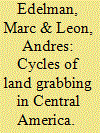

|
|
|
|
|
| Publication |
2013.
|
| Summary/Abstract |
The lack of historical perspective in many studies of land grabbing leads researchers to ignore or underestimate the extent to which pre-existing social relations shape rural spaces in which contemporary land deals occur. Bringing history back in to land grabbing research is essential for understanding antecedents, establishing baselines to measure impacts and restoring the agency of contending agrarian social classes. In Central America each of several cycles of land grabbing-liberal reforms, banana concessions and agrarian counter-reform-has profoundly shaped the period that succeeded it. In the Bajo Aguán region of Honduras-a centre of agrarian reform and then counter-reform-violent conflicts over land have been materially shaped by both peasant, landowner and state repertoires of contention and repression, as well as by peasants' memories of dispossession.
|
|
|
|
|
|
|
|
|
|
|
|
|
|
|
|
| 5 |
ID:
133973
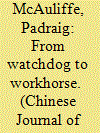

|
|
|
|
|
| Publication |
2014.
|
| Summary/Abstract |
Though it was initially presumed that the primary role of the International Criminal Court (ICC) would be a residual one of monitoring and ensuring the fulfilment by the State of its obligations under the Rome Statute, it has over time moved towards a more activist "burden-sharing" role. Here, the Office of the Prosecutor initiates prosecutions of the leaders who bear the most responsibility for the most egregious crimes and encourages national prosecutions for the lower-ranking perpetrators. Since at least 2006, the Prosecutor has committed to a formal policy of inviting and welcoming voluntary referrals as a first step in triggering the jurisdiction of the Court. The judges on the Court have approved these referrals, while the broader academic and activist communities welcomed this more vertical relationship with national jurisdictions and, significantly, have provided the intellectual justifications for it. Burden-sharing, a concept unmentioned at the Rome Conference establishing the ICC, is presented as an unproblematic, natural and organic emanation from the Statute. This article argues that this development was not in fact inevitable or mandated by the Rome Statute. It was chosen, and in justifying this choice, familiar modes of cosmopolitan-constitutionalist treaty interpretation fundamentally premised on the field's virtue and indispensability have operated to enable a Court established as a residual watchdog to become a workhorse in individual situations by assuming the preponderance of responsibility for combating impunity.
|
|
|
|
|
|
|
|
|
|
|
|
|
|
|
|
| 6 |
ID:
132755
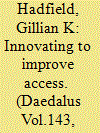

|
|
|
|
|
| Publication |
2014.
|
| Summary/Abstract |
Struggling to navigate a world that is increasingly shaped by legal rules and obligations, most ordinary Americans lack real access to courts. Often this means simply forgoing legal rights and entitlements or giving up in the face of claims of wrongdoing. Among those who cannot avoid courts-such as those facing eviction, collection, or foreclosure and those seeking child support, custodial access, or protection from violence or harassment-the vast majority (as many as 99 percent in some cases) find themselves in court without any legal assistance at all. There are many reasons for this lack of meaningful access, including the underfunding of courts and legal aid, but perhaps the most fundamental is the excessively restrictive American approach to regulating legal markets. This regulation, controlled by the American legal profession and judiciary, closes off the potential for significant reductions in the cost of, and hence increases in access to, courts. Unlike the problem of funding, that is a problem that state courts have the power, if they can find the judicial will, to change.
|
|
|
|
|
|
|
|
|
|
|
|
|
|
|
|
| 7 |
ID:
132999
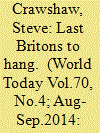

|
|
|
|
|
| Publication |
2014.
|
| Summary/Abstract |
Fifty year ago, on August 13, 1964 Gwynne Evans and Peter Allen were hanged. They had been convicted of the murder of John West of his home in Cumbria during a robbery four month earlier. The men were sentenced to suffer death in the manner authorized by law: Evan was hanged 8am in Strangeway Prison, Manchester, Allen in Walton Prison, Liverpool, at the same of the same day.
|
|
|
|
|
|
|
|
|
|
|
|
|
|
|
|
| 8 |
ID:
133944
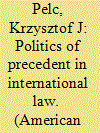

|
|
|
|
|
| Publication |
2014.
|
| Summary/Abstract |
The concept of precedent is fundamental to domestic courts, especially in Anglo-American common law systems, where judges are bound to the court's past decisions. By contrast, precedent has no formal authority in international law. Legal scholars point to Article 59 of the International Court of Justice (ICJ) Statute in this respect, according to which international legal rulings are binding only on the parties in the dispute at hand, and have no bearing on matters outside of the case.
|
|
|
|
|
|
|
|
|
|
|
|
|
|
|
|
| 9 |
ID:
132745
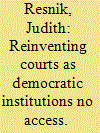

|
|
|
|
|
| Publication |
2014.
|
| Summary/Abstract |
Eighteenth-century constitutional commitments guaranteeing rights-to-remedies were shaped when members of the propertied classes were the prototypical litigants and governments' criminal justice systems were nascent. Twentieth-century egalitarian norms expanded the imagination of what justice could produce, and courts turned into sites of democracy. The particular and peculiar practices of adjudication produce, redistribute, and curb power among disputants who disagree in public about the import of legal rights. But new procedures-alternative dispute resolution (ADR)-encourage, and sometimes require, disputants to mediate or to arbitrate disputes privately as a predicate to or in lieu of using the public forum of courts. Some initiatives delegate adjudication to administrative tribunals, and others outsource binding decision-making to private providers. The resulting fragmentation and privatization of adjudication have profound implications for the newly minted democratic character of courts. The durability of courts as active and disciplined sites of public exchange ought not to be taken for granted. Like other venerable institutions of the eighteenth century-such as the postal service and the press, which served in parallel fashion to disseminate information and support democratic competency-courts are vulnerable.
|
|
|
|
|
|
|
|
|
|
|
|
|
|
|
|
| 10 |
ID:
130701
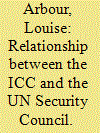

|
|
|
|
|
| Publication |
2014.
|
| Summary/Abstract |
THE POWER OF THE UNITED NATIONS SECURITY COUNCIL TO REFER COUNTRY situations to the International Criminal Court (ICC) has been hailed, particularly among international human rights activists, as a chance to expand the reach of international criminal justice by offering the opportunity to hold accountable perpetrators of atrocities who might otherwise be exempt from prosecution and punishment. The historic referral of the situation in Darfur in March 2003 was widely welcomed as an important step in the fight against impunity as was the Security Council's later, and more controversial, referral of Libya in February 2011. In principle the expansion of the reach of accountability is something to be welcomed, but it is important to recognize the costs of this expansion as well as the danger that they may outweigh the intended benefits.
|
|
|
|
|
|
|
|
|
|
|
|
|
|
|
|
| 11 |
ID:
131812
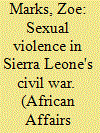

|
|
|
|
|
| Publication |
2014.
|
| Summary/Abstract |
Rape and sexual violence loom large in the study of civil war in Africa. Sierra Leone has been one of the most prominent cases for establishing rape as a 'weapon of war', yet little is known about how sexual violence was understood by commanders or combatants within the Revolutionary United Front (RUF). Mainstream analyses of armed groups and civil war rarely engage with gender dynamics, despite their centrality to war making, power, and violence; and research that does focus on sexual violence tends to overlook the complex internal dynamics of the groups responsible. This article examines the internal gender dynamics of the RUF from the perspective of male and female members in seeking to understand the perpetration of sexual violence. It shows that both formal and informal laws and power structures existed to regulate gender relations and control sexual behaviour within the group. It identifies four categories of women - non-wives, unprotected wives, protected wives, and senior women - and shows that women's interests and experiences of sexual violence were not homogeneous, but were instead shaped by their status within the group. In this way, sexual violence, examined in social context, provides an entry point for understanding how power, protection, and access to resources are brokered in rebellion.
|
|
|
|
|
|
|
|
|
|
|
|
|
|
|
|
| 12 |
ID:
132749
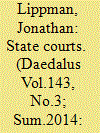

|
|
|
|
|
| Publication |
2014.
|
| Summary/Abstract |
In New York, millions of civil litigants each year fight for the necessities of life without the aid of a lawyer because they are unable to afford one. While the state courts strive to provide access to justice for all constituents, this ideal becomes a promise unfulfilled due to the lack of available civil legal services for low-income populations. In this essay, I discuss access to justice in the state courts from the perspective of my role as Chief Judge of the State of New York. I examine the enormity of the unmet need in New York and around the country and discuss the measures I have taken as head of the New York State court system to address the crisis. These efforts have resulted in a substantial increase in state funding for civil legal services, the establishment of the Task Force to Expand Access to Civil Legal Services in New York, annual hearings in each of New York's four Judicial Departments, and the development of programs designed to spur the legal community (including law students) to greater involvement in pro bono work.
|
|
|
|
|
|
|
|
|
|
|
|
|
|
|
|
| 13 |
ID:
124600
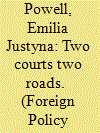

|
|
|
|
|
| Publication |
2013.
|
| Summary/Abstract |
The International Court of Justice (ICJ) and the International Criminal Court (ICC) constitute two prominent international courts. However, there exists considerable variation in states' support for these two institutions. The Rome Statute, which recognizes the jurisdiction of the ICC has been ratified by over half the states in the world; only a third of states accept the compulsory jurisdiction of the ICJ. How are we to understand this variation in state support for these two courts? I argue that there is an inherent link between the quality of a state's domestic legal system (rule of law) and perceived legitimacy of an international court. Empirical analyses of states' support for the ICJ and the ICC show that rule-of-law states lend support to the ICC, a court perceived by the international community as legitimate. Alleged bias of the ICJ has, on the other hand, substantially weakened support for this court among rule-of-law states.
|
|
|
|
|
|
|
|
|
|
|
|
|
|
|
|
| 14 |
ID:
131793
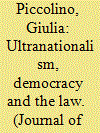

|
|
|
|
|
| Publication |
2014.
|
| Summary/Abstract |
Although much has been written about the ideology of Laurent Gbagbo's Front Populaire Ivoirien in Côte d'Ivoire and its impact on the Ivorian politico-military crisis, little attention has been paid to the ubiquitous role of the law in the discourse and political strategy of the pro-Gbagbo elite. The Ivorian case may provide important insights about the connection between ultranationalist ideology and a legalist, formalist conception of democracy and national sovereignty. The article analyses the circumstances of the emergence of 'legalist nationalism' in Côte d'Ivoire by looking at key episodes of the Ivorian transition between 2002 and 2012. The article discusses the relevance of Pierre Englebert's concept of 'legal command' and the turbulences of democratic transitions in accounting for the prominence of legalism in Ivorian politics. It explores the implications of the Ivorian case for understanding the connection between law and politics in Africa.
|
|
|
|
|
|
|
|
|
|
|
|
|
|
|
|
| 15 |
ID:
132750
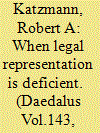

|
|
|
|
|
| Publication |
2014.
|
| Summary/Abstract |
When the quality of lawyering is inadequate, courts are frustrated in their adjudicative role. Nowhere is this more apparent than in cases involving immigrants hoping to fend off deportation. As an appellate judge on a court whose immigration docket reached 40 percent of our caseload, I have too often seen deficient legal representation of immigrants. Although courts are reactive, resolving cases before them, judges can systematically promote the fair and effective administration of justice. With the aid of some outstanding legal talent, I created the Study Group on Immigrant Representation to help address the immigrant representation crisis. Our work has encompassed a variety of activities, including: publishing symposia; conducting studies documenting the enormity of the problem and proposing solutions; creating initiatives to expand pro bono representation; facilitating the first local government funding of direct immigrant legal services; creating legal orientation programs for immigrants; and developing the Immigrant Justice Corps, an innovative fellowship program. These initiatives represent some steps towards easing the crisis in immigrant legal representation.
|
|
|
|
|
|
|
|
|
|
|
|
|
|
|
|
| 16 |
ID:
184563
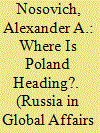

|
|
|
|
|
| Summary/Abstract |
The sociopolitical split in Polish society disorients Warsaw’s Eastern policy.
Poland has historically positioned itself as a missionary in Eastern Europe,
but the current internal conflict calls into question the very essence of
this mission. On the one hand, Warsaw clearly intends to facilitate the
integration of states in the western part of the post-Soviet space into the
Western structures. On the other hand, a significant part of Polish society,
whose views are represented by the country’s leadership, is unhappy about
the trends afoot in the United States and Western Europe and sees Poland
as a conservative alternative to the Western mainstream. For its part, the
liberal part of society is dissatisfied with this standoff and insists that
Poland should follow the main social trends of major Western countries. As
a result, Poland has found itself facing an identity crisis.
|
|
|
|
|
|
|
|
|
|
|
|
|
|
|
|
|
|
|
|
|